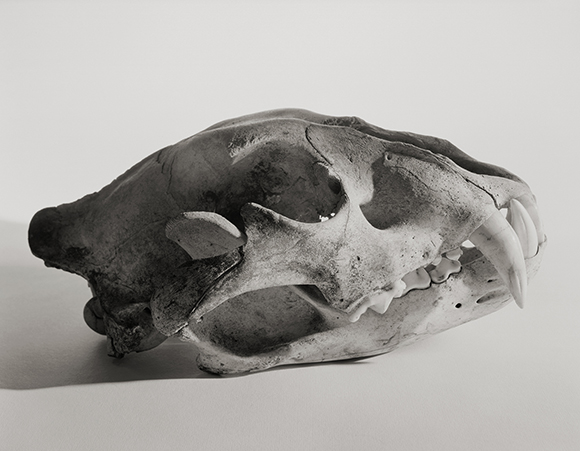 By Yumiko Izu
By Yumiko Izu
Cool to my fingers in the stifling summer air, the skull of the elephant exudes tranquility. Sunlight filters through the trees, dancing on the bulky curves. I gather up the skull with my arms, measuring its heft. When my palm slides into an indentation, an image of the skull, naked and decaying on the plain, drifts to the surface of my mind.
The skull of the bear rustles as I lift it. Stealing a look inside, I glimpse a pair of leaves entangled on a cobweb, remnants of autumn. Insects, like minute grains of sand, squirm on the skull’s edge. At one with their host, they scatter like froth from a breaking wave. I press down on them with the pad of my index finger, but they return to their doings, marching in an infinite line that reconnects with the earth.
On a cold midwinter afternoon I discover the deer skull, still tufted with fur. I bring it home, lay it on a snowbank, spray water from a hose to dissolve its brown pedestal of dirt. Clots of blood speckle the cheeks, conversing with hairline cracks in a dense and unfathomable dialogue. Its twisted antlers rise before me eyes like the twisted branches of trees, recalling the deeply wooded forest.
As I await the end of my camera’s lengthy exposure, I hear—or, perhaps, imagine—the faint echo of bones stirring, their essence emerging. Arrested in dull illumination, the skull of the giraffe reveals its refined outline and the vacant expanse of eye sockets. Bones, bleached by the years, scarred with numberless cracks and clefts. Particles of dust, minute and white, stirred by a vagrant breeze. Beneath the crystalline surface, a helical ocean, twisted like a shell, is buried out of view.
The mysteries of existence silently congeal in a brittle, enticingly beautiful carapace.
Holding my breath, I attempt to follow and entrap the subtle residue of life within. In an instant, it is apparent that I, the observer, have become the observed. Fragments of a dead animal’s memory, lost to time; myself, the gatherer of those fragments. The murmur of a continental plain, the scent of rain-moistened soil. A horizon lit at dawn, the dazzle of stars in spring. Each layer of our universe is penetrated by the transparent particles of time. And, at the distant terminus of time and space, life and death—embraced in my peaceful reverie—are reversed, rearranged, become one.
Essay
Faraway: The Extremity of Darkness
Faraway: 闇の彼方へ
井津由美子
夏の濃密な空気の中、象の骨のまわりだけがひんやりと冷たく、静謐さを纏っていた。丸みを帯びた曲線に、木漏れ日がやさしく揺らいでいる。両腕をまわして、ゆっくりと抱きしめるように重みを確かめた。窪みに掌をそえると、野ざらしのまま大地に還る姿がふと幻のように浮かんだ。
そっと熊の骨を持ち上げるとかさかさと音がした。中を覗くと秋のなごりの落ち葉が二枚、蜘蛛の巣に絡めとられている。その先に蠢いているのは砂粒のような虫たち。宿主と同化しながら、返す波が砕けるように散っていく。人差し指のはらで潰しても、すぐにまた現れる。まるで地の底と繋がっているように、行列は果てしなく続いていく。
凍えそうな真冬の午後、持ち帰った鹿の骨には、まだわずかに毛が残っていた。真っ白な雪の上におき、ホースの水で後ろの褐色の汚れを取り除いていく。正面の血の雫は拭かずにそのまま残すと、それらは頬の亀裂と響き合うように散らばり、複雑な模様が浮かび上がった。方々に伸びた角は樹々のひと枝となり、そのまま深い森の奥でひっそりと息づいているようだ。
長い露光の間に、微かに骨のきしむ音が聞こえたのは私の錯覚だったのだろうか。鈍い光に照らされて、麒麟の頭蓋骨の精緻な輪郭と、ぽっかりくり抜かれた空洞の目が浮かび上がる。朽ちた染み、表面を覆う無数の傷とひび割れ。時おりそよぐ風に微細な白い塵が舞い、透きとおる殻の内側には巻貝のような螺旋の海が隠れている。命の不思議を凝縮したかのような脆く美しい存在と静かに対峙する。その器に宿るわずかな生の残滓を捉えようとして、息を詰めたまま気配を追っていく。いつのまにか、見つめているはずの私が、見つめられていることに気付く。こぼれていく今は亡き獣の記憶のかけら、それを拾い集める私。大陸の草原のざわめき、雨に湿った土の匂い。朝日に燃える地平線、きらめく春の星空。幾重にも広がる宇宙に、透明な時の粒子が吹き抜けていく。生と死が、時空の彼方で入れ替わり交わりひとつになる、そんな密やかな夢を見た。